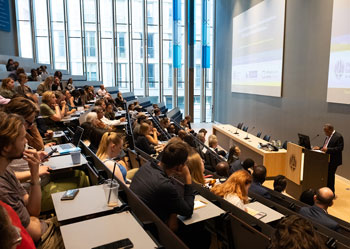News & Events
 Find the latest news below, and our event calendar on the right.
Find the latest news below, and our event calendar on the right.
Would you like to stay updated on our latest research news, publications and events? Please subscribe to our monthly newsletter!
Posted on 9 November 2011, last modified on 9 October 2023
26 March 2020
The Africa Knows! conference, the final activity of the Africa 2020 year, kicked off during the opening days from 2-4 December, and will last until 28 February. Africa Knows! is about knowledge production in and about Africa. The knowledge landscape in African countries has changed radically in recent years. A growing demand for higher and scientific education has resulted in numerous (private) initiatives. Calls to decolonise knowledge and education are getting louder. At the same time, education has experienced a dramatic blow as schools have been forced to close their doors during the past year. The conference will take place fully online.
25 March 2020
This book, edited by Duncan Money and Danelle van Zyl-Hermann, showcases new research on white workers and the white poor in Southern Africa. It demonstrates that social class remained a salient element throughout the twentieth century, how Southern Africa’s white societies were often divided and riven with tension and how the resulting social, political and economic complexities animated white minority regimes in the region.
23 March 2020
The current corona crisis is revealing just how interconnected our world is. Perhaps more interesting, it also shows how continents, countries and localities are differently connected, and differently integrated in the global economy and in the global movement of people. Why does Africa seem so little affected in comparison to other regions of the globe? Mayke Kaag looks for answers in her latest blog post.
19 March 2020
06 March 2020
In the framework of the programme University of Edinburgh-University of Leiden Joint Funded PhD Studentships, the African Studies Centre Leiden will recruit two PhD candidates. The proposed research must address topics of urbanisation, urbanity, and urban diversity in relation to African Studies. The proposed research should also relate to one (or more) of ASCL’s priority research themes as identified by its Collaborative Research Groups. Submit your application online no later than 1 May 2020. Read more about the selection criteria.

